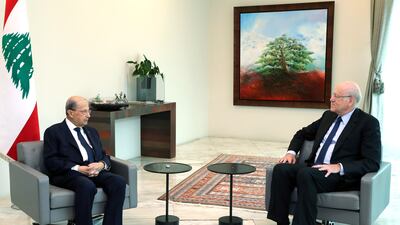Control of Lebanon’s Interior Ministry has become a major point of contention in negotiations as prime minister-designate Najib Mikati attempts to form a government.
President Michel Aoun and Gebran Bassil, head of the largest Maronite Christian party and Mr Aoun's son-in-law, are trying to wrest control of the ministry into the arms of their Free Patriotic Movement.
They are being resisted by Mr Mikati and three other former prime ministers backing his nomination.
Mr Mikati believes control of the ministry is crucial to the success of the Cabinet he is trying to form, a source close to the prime minister-designate told The National.
Control of the ministry will also allow direction of next year’s parliamentary elections, something that has gathered greater urgency amid the political and economic crisis.
Lebanese law states that the ministry is the “primary body for administering elections,” with responsibilities that range from producing voter lists to coordinating security on polling day.
In public, billionaire telecoms magnate Mr Mikati has said that he and President Aoun are in agreement regarding much of the Cabinet line-up.
“I have given President Aoun my proposals for a Cabinet and I felt acceptance from him, while I took his observations into consideration,” he told reporters after meeting President Aoun on Wednesday.
Yet the disagreement over the Interior Ministry risks derailing the whole effort to nominate a Cabinet after almost ten months of deadlock Hassan Diab’s caretaker government.
All parties are keeping a close eye on how a Mikati administration may impact them in the lead-up to next year’s elections.
Mr Diab’s government resigned after the Beirut port explosion last August, leaving Lebanon in a political morass ever since.
The country has fallen into what the World Bank has described as one of the worst economic crises of the last 150 years.
Lebanon’s established political parties are set to face an unprecedented challenge from civil society and independent groups planning to run.
Earlier this month, an independent coalition took control of Lebanon’s Syndicate of Engineers and Architects. Activists say that victory in union elections is a testing ground for national elections next year.
The European Union is set to publish its sanctions regime early next week.
It will set the legal basis and will give grounds on which figures may be subject to sanctions including travel bans and asset freezes from the 27-member bloc. A list of names will follow soon after.









